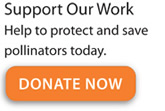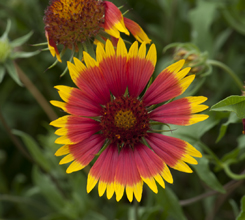 |
POLICY AND CONSERVATION
Reducing the impacts of pesticides on pollinators:
In 2008 an industry survey identified a significant knowledge gap with respect to beneficial insects and pesticide application techniques, as well as an overwhelming desire for educational materials. With better guidelines and continuing education programming unintended kills of crop pollinators can be avoided, pollination services secured, and crop productivity increased. P2 is working with a diverse set of stakeholders to develop a training package that will synthesize best management practices for pesticide application into practical and applied technical tools for securing pollination services and ensuring crop yields.
Read the latest from the OPERA Research Center on bee health in Europe.
Read the latest: SETAC Pellston Workshop on Pesticide Risk Assessment for Pollinators. View the 45 Page Report by clicking here.
Bombus White Paper:
The North American Pollinator Protection Campaign (NAPPC), Pollinator Partnership’s largest initiative, produced a white paper about the status and potential effects of non-native bumble bees, such as Bombus terrestris, on native populations of bumble bees and other pollinators. This project is a response to questions raised by scientists and policymakers in North America following the initial importation of the European bumble bee species, Bombus terrestris, to Mexico for greenhouse tomato production.
Link: http://www.pollinator.org/Resources/BEEIMPORTATION_AUG2006.pdf
Highways Bee Act:
Highway rights-of-way represent about 17 million acres of opportunity for significant reductions in mowing and maintenance to reduce costs while improving habitat for pollinators. Reductions in roadside mowing, combined with enhanced plantings of native forbs and grasses, can provide economic benefits, reduced carbon emissions, and critical habitat for pollinators. This legislation supports and builds on innovative Integrated Vegetation Management (IVM) efforts in a growing number of State Departments of Transportation by directing the Secretary of Transportation to use existing authorities, programs, and funding. The bipartisan legislation is under consideration as part of the transportation reauthorization process.
Click here to find out more about this initiative.
|

Gaillardia spp. are one of many very attractive flowers preferred by native bees.
|

